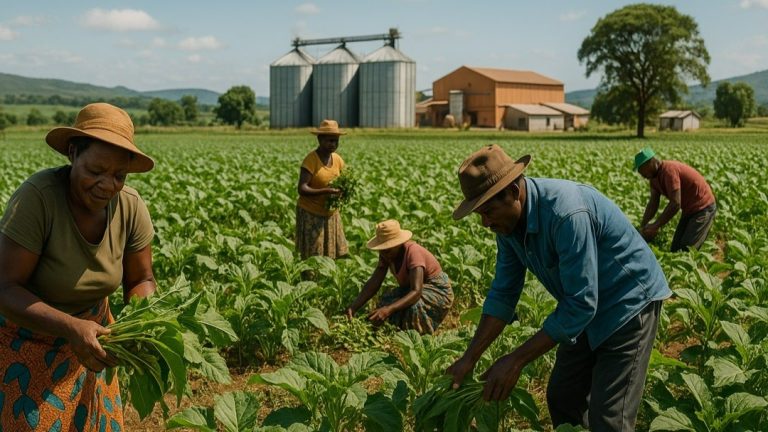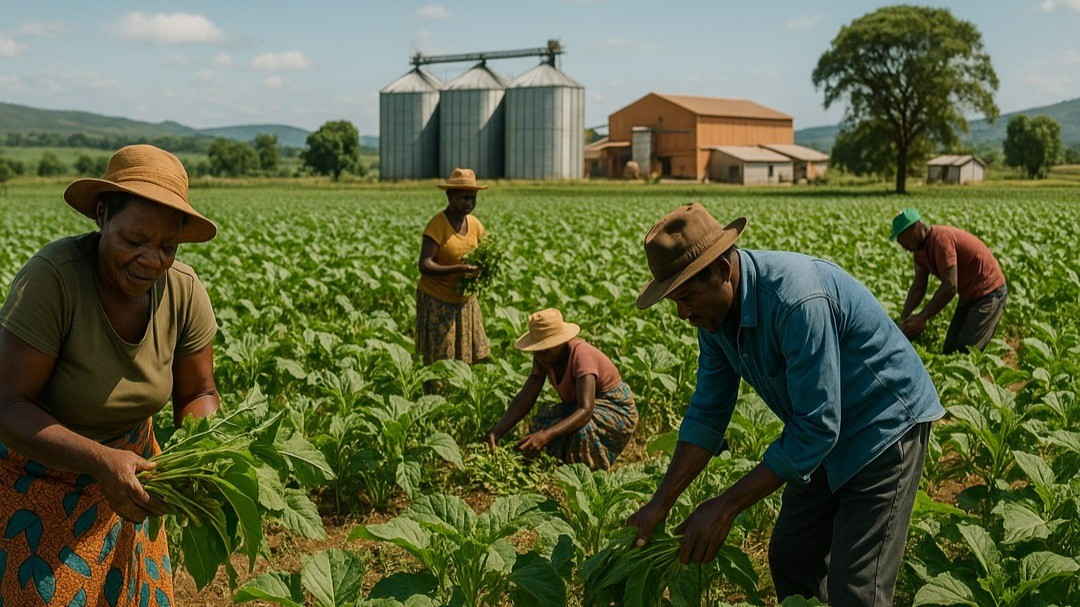Agribusiness as a Catalyst for Rural Employment and Economic Inclusion
This Duja Consulting paper explores how agribusiness acts as a catalyst for rural employment and economic inclusion. Agribusiness doesn’t just boost rural economies—it transforms communities by integrating smallholder farmers, developing value chains, and improving market access.
Key insights include:
✅ The critical role of value chain development
✅ How inclusive models empower smallholders
✅ Agro-processing as a driver of rural industry
✅ Practical case study from Zimbabwe
Dive into the full paper to see how agribusiness initiatives can sustainably uplift rural communities.

Introduction
Rural communities in developing regions rely heavily on agriculture for their livelihoods. However, traditional subsistence farming alone often struggles to lift rural populations out of poverty. Agribusiness – the network of farming-related business activities from production to processing and marketing – has emerged as a powerful catalyst for transforming rural economies. By moving beyond basic crop production into value-added activities, agribusiness can create jobs, raise incomes, and promote inclusive economic development in rural areas. In fact, growth in agriculture is estimated to be two to three times more effective at reducing poverty than growth in other sectors, underlining the critical role agribusiness can play in development. Small-scale farmers produce much of the world’s food, so integrating them into profitable agribusiness value chains is crucial for broad-based progress. This report examines how agribusiness contributes to job creation and inclusive economic growth in rural areas. It discusses four key mechanisms – value chain development, smallholder farmer integration, agro-processing, and improved market access – and presents a case study from Africa to illustrate these concepts in practice.
Value Chain Development: Linking Farm to Market
One way agribusiness drives rural employment is through value chain development. An agricultural value chain encompasses all the steps involved in bringing a product from the farm to the final consumer, including input supply, cultivation, processing, distribution, and marketing. Strengthening these links creates opportunities for new businesses and jobs at each stage. A thriving food value chain not only employs farmers, it also generates work for input suppliers, transport workers, processing factory employees, traders, and retailers. The food system already produces millions of on-farm jobs and has the potential to generate millions more in related off-farm positions across the supply chain. By identifying bottlenecks or gaps in the chain and investing in improvements, communities can capture more value locally.
Effective value chain development often requires collaboration between farmers, agribusiness firms, and governments. For instance, improving rural infrastructure (roads, storage, electricity) reduces post-harvest losses and speeds goods to market, and providing farmers with extension training helps them meet the quality standards that processors and consumers demand. When local value chains function efficiently, a higher share of the final product’s value remains in rural areas. This means more income and employment for rural households instead of profits leaking out to middlemen or urban centres. Developing value chains in an inclusive way also ensures that small farmers and local entrepreneurs can participate, rather than being bypassed in favour of large external corporations.
Integrating Smallholder Farmers: Inclusive Business Models
Ensuring that smallholder farmers are fully integrated into agribusiness value chains is crucial for economic inclusion. Smallholders – farmers who often cultivate only a few hectares – make up the majority of farming households in developing countries and produce a large share of the food supply. Yet historically, they have faced barriers in accessing credit, technology, and markets, which limits their productivity and incomes. Inclusive agribusiness models work to bring small farmers into the commercial fold so they can share in the benefits of growth. One common approach is contract farming or “outgrower” schemes, where agribusiness companies partner with smallholders to supply a crop. Farmers receive support such as improved seeds, fertilizer, training, and a guaranteed buyer, while the company in return obtains a reliable supply of produce meeting its standards. This kind of arrangement gives farmers security and knowledge to increase their output, and it provides them with a more stable income than open market sales.
Another model is organizing farmers into cooperatives or producer organisations. By pooling resources and working collectively, small farmers gain better bargaining power and can achieve economies of scale. Cooperatives can collectively market produce, negotiate fair prices, or even establish processing facilities owned by the members. This not only creates rural jobs (for example, co-op management and staff) but also ensures that profits are redistributed to farmer-members, fostering inclusive growth. Integrating smallholders often requires bridging gaps in skills and resources – for instance, providing microfinance to buy inputs or training in business practices. Governments and NGOs frequently facilitate these integrations by launching programmes to link farmers with agribusinesses or to improve rural finance and extension services.
The end result of successful smallholder integration is a win-win: agribusinesses secure raw materials supply, and thousands of small farming families see higher earnings and better livelihood security.
Agro-Processing and Value Addition: Creating Rural Industry
Promoting agro-processing industries in rural areas is another powerful mechanism by which agribusiness generates employment and fosters inclusion. Agro-processing refers to turning raw agricultural products into finished or semi-finished goods – for example, milling grain into flour or processing milk into cheese. These activities create value addition, meaning the products fetch higher prices than unprocessed crops, and they require labour beyond the farm. Establishing processing facilities close to farming areas can spark the development of rural agribusiness clusters or hubs. Such enterprises range from small cottage industries to large factories processing food on an industrial scale. Each processing venture creates direct jobs in factories for operators, technicians, and managers, and indirect jobs in services like maintenance, transport, and storage.
Crucially, agro-processing keeps more of the value chain within the local economy. Rather than farmers sending away raw produce and earning the lowest share of value, processing enables a greater portion of the final sale price to be captured by producers, workers, and businesses in rural regions. The Food and Agriculture Organization (FAO) notes that adding value to agricultural products in rural areas – for instance through local processing – offers great potential to boost rural employment, increase incomes, and reduce poverty. Many countries have recognised this and are investing in agro-industrial parks, food processing centres, and incentives for agribusiness firms to set up in rural districts. Agro-processing also often improves market stability for farmers: for example, perishable crops can be processed into more shelf-stable products, reducing waste and allowing farmers to sell more of their harvest. In sum, developing agro-processing is akin to rural industrialisation – it diversifies the rural economy beyond raw farming and creates inclusive job opportunities for those who may not have land.
Improving Market Access: Connecting Rural Producers to Opportunities
Even when farmers produce a surplus or high-quality goods, lack of access to lucrative markets often prevents them from turning it into income. Agribusiness acts as a bridge between isolated farming communities and broader markets, ensuring that small producers can sell their goods at fair prices. One aspect of improving market access is investing in transport and logistics. Good feeder roads, affordable transport services, and storage facilities allow farmers in remote villages to get their crops to urban markets or export hubs before they spoil. Additionally, agribusiness companies or cooperatives often establish collection centres in rural areas, where farmers can conveniently deliver their produce. This spares individual farmers from the burden of travelling long distances with small loads and can reduce their transaction costs.
Another aspect is providing market information and linkages. In the past, rural farmers might be at the mercy of local traders offering very low prices because the farmers had no information on prevailing market rates or no alternative buyers. Today, agribusiness firms and development programmes help connect farmers to wider networks of buyers. This can involve digital platforms and mobile phone services that inform farmers of commodity prices, or matchmaking services that connect producer groups with food companies and exporters. By linking farmers directly to buyers, agribusiness models ensure producers get a larger share of the consumer price. It also encourages farmers to increase production and quality when they know there is a reliable market. Improved market access thus leads to higher and more stable incomes for rural households. When small farmers have confidence that they can sell their crops profitably, they are more likely to hire additional labour, invest in better inputs, or expand into new ventures – actions that ultimately generate more employment. Overall, connecting rural producers to markets is a key pillar of making economic development more inclusive.
Case Study:
Smallholder Outgrower Scheme in Zimbabwe
A practical example from Africa can illustrate how agribusiness fosters rural employment and inclusion. In Zimbabwe, the agribusiness company Better Agriculture Pvt Ltd has partnered with small-scale farmers in an outgrower scheme to supply high-value markets. This outgrower model provides farmers with inputs on credit, technical training, and a guaranteed market for their produce. The company works with over 1,100 smallholder farmers – about 68% of them women – and this arrangement has created a wave of new economic activity: farmers earned more from selling chillies and peas, and local youths found work in crop aggregation and transport, spreading employment benefits throughout the community.
One of the participants, a woman named Alice Sakubende, highlights the scheme’s impact on economic inclusion. Initially, Alice’s husband held the farming contract and received the income, even though she did most of the work on the chilli farm. Like many women in rural Zimbabwe, Alice had little say over how the earnings were used. Recognising this imbalance, the company adjusted its model to allow multiple family members to hold farming contracts, so that women like Alice could contract directly with the company. Alice improved her farming techniques. The company also set up local collection points in the community, so that farmers (especially women) would not have to travel long distances to deliver produce – overcoming a major barrier to market access. Moreover, payments were made via mobile money directly into each farmer’s account, giving women control over their earnings.
The outcomes were significant for Alice and others in her village. With reliable market access and higher productivity, her income rose substantially. Alice was able to pay her children’s school fees on time and even build a new house for her family using the profits from chilli farming. Many other farmers in the programme similarly reported improved livelihoods, better food security, and new assets such as livestock. For the wider community, the infusion of income from the chilli and pea sales stimulated the local economy – spurring the growth of small shops and services. This Zimbabwe case demonstrates how an inclusive agribusiness approach can serve as a catalyst for rural development: it created jobs (on farms and in supporting activities), empowered women economically, and increased the overall prosperity of a previously impoverished rural area.
Challenges and Enabling Factors
While agribusiness holds great promise for rural employment and inclusion, it is not a silver bullet. Certain challenges must be addressed to realise its full benefits. One challenge is ensuring fairness in arrangements between powerful agribusiness firms and small farmers, so that farmers do not become dependent on single buyers or burdened by input debt. Transparent contracts and strong farmer organisations can help to protect smallholders’ interests. Another challenge is the lack of basic rural infrastructure and services. Agribusiness ventures struggle in areas without good roads, electricity, or water, and where farmers lack education or extension support. Governments have a critical role in creating an enabling environment through rural investment, favourable policies, and supportive institutions.
Building resilience into agribusiness models is also crucial. Initiatives should incorporate measures like crop insurance, diversification, and climate-smart farming practices to help communities withstand bad years. Finally, to include marginalised groups such as women, landless labourers, or youth, agribusiness programmes should set social inclusion targets – for instance, ensuring a certain percentage of participants are women, or providing youth training and start-up capital for agri-entrepreneurship.
Conclusion
Agribusiness can be a catalyst for rural employment and economic inclusion if developed thoughtfully. By strengthening agricultural value chains, integrating smallholder farmers, adding value through processing, and connecting producers to markets, agribusiness initiatives create jobs and broaden economic inclusion in rural communities. The result is not only more employment, but also inclusive growth – meaning even marginalised rural groups share in the progress. The case of Zimbabwe’s outgrower scheme illustrates the tangible impacts: higher incomes, empowerment of disadvantaged groups, and local economic dynamism. To replicate such successes, stakeholders must invest in underlying conditions that allow agribusiness to flourish – infrastructure, training, fair policies, and partnerships. When done right, agribusiness development can turn subsistence-based villages into vibrant centres of production and commerce. Agribusiness, in summary, provides a pathway for rural communities to achieve sustainable livelihoods and greater economic inclusion, making it a vital component of development strategies in the years ahead.






